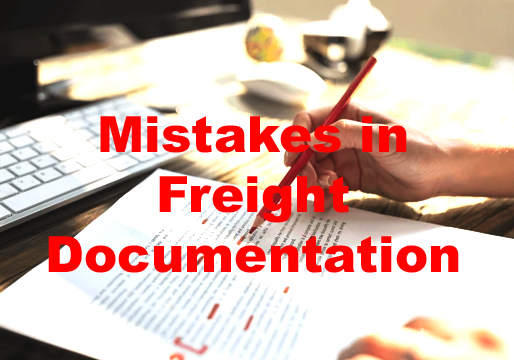Freight documentation is an important & fundamental part of the logistics process, and even some minor mistakes can lead to delays, arising extra costs, or legal issues. Below are some of the common mistakes made in freight documentation and how to avoid it.
1. Incorrect or Missing Harmonized System (HS) Codes
Mistake:
- Basically HS codes are used to classify the goods for customs clearance. Wrong classifying goods can arise in incorrect duties, taxes, and delays.
How to Avoid It:
- To verify the correct HS code for each & every product depends on international standards. We can get advice from a customs person or check the official customs tariff of our country.
- Use a proper product description to ensure the HS code.
2. Discrepancies Between Shipping Documents
Mistake:
- Mismatches in the Commercial Invoice, Packing List, and Bill of Lading or Airway Bill in terms of product description, quantity, weight, or value can cause delays in customs clearance.
How to Avoid It:
- To ensure all documents have proper information about the goods description, quantity, weight, and value also.
- Re-check the details among the invoice, packing list, and bill of lading before presentation.
3. Incomplete or Incorrect Commercial Invoice
Mistake:
- Missing of key details in the commercial invoice like payment terms, Incoterms, or duty classification can delay customs processing and create confusion during the shipment.
How to Avoid It:
- Ensure all required information as below:
- Description of sold goods.
- Unit price and total value of the goods.
- Incoterms like FOB, CIF, DDP.
- Terms of payment which can be Letter of Credit or bank transfer.
- HS code.
- Review the invoice before submission to ensure that all are ok.
4. Missing or Incorrect Packing List
Mistake:
- When a Packing List doesn’t match with the actual shipment product then it can cause delays and create issues at the destination, especially during review by customs or the importer.
How to Avoid It:
- To ensure the Packing List accurately as below:
- Quantity of each & every item.
- Follow Packaging methods like cartons, pallets.
- Sizes and weight.
- Marks and numbers on the shipped goods.
- Re-check the packing list to ensure that it matches the actual goods being shipped.
5. Incorrect Bill of Lading (B/L) Details
Mistake:
- Errors in the Bill of Lading, such as wrong consignee or importer details, missing of signatures, or wrong terms of shipment, can cause delays in delivery and customs clearance.
How to Avoid It:
- Confirm that the Bill of Lading:
- Matches the Commercial Invoice and Packing List.
- Has the correct consignee or importer information like name, address, contact details.
- Clearly states the terms of shipment which are called Incoterms.
- Includes exact port details like port of loading and destination.
6. Failure to Comply with Destination Country Regulations
Mistake:
- When we are not aware of destination country regulations like import duties, customs laws, product certifications, or import licenses, it can lead to the shipment being rejected or delayed.
How to Avoid It:
- Research about the destination country regulations to understand the required documentation, such as:
- Import license which is for some restricted goods.
- Product certifications like CE, UL for electronics.
- Health or safety documentation which is needed for pharmaceuticals or food.
- Labeling requirements like language, content, etc.
- Work with a customs authority person to become familiar with the destination country’s rules.
7. Incorrect Incoterms
Mistake:
- Incorrect & wrong use of Incoterms can create confusion over who is responsible for shipping costs, duties, taxes, and insurance.
How to Avoid It:
- Make sure to select the right Incoterm depending on the agreement with the buyer/seller. Ensure that both parties understand the responsibilities for delivery, costs, insurance, and risks like FOB, CIF, DDP.
- Re-check the contract with our buyer/seller to confirm agreed terms & conditions.
8. Wrong or Insufficient Insurance Coverage
Mistake:
- Lacking to arrange the appropriate insurance for the shipment or using inappropriate coverage like all-risk insurance vs. limited coverage can lead to costly losses if goods are damaged or lost during transit.
How to Avoid It:
- Assessments of the risk engaged with the shipment mostly value, fragility, transport method.
- Arrange for appropriate insurance coverage to secure against potential risks.
- Recheck the policy terms to ensure the coverage fulfills the needs of the shipment.
9. Incorrect or Missing Certificate of Origin
Mistake:
- When a missing or incorrect Certificate of Origin is issued then it can delay customs clearance, especially when the goods are going to preferential tariff treatment or anti-dumping duties.
How to Avoid It:
- To ensure the Certificate of Origin is correctly issued by an esteemed authority, such as the Chamber of Commerce.
- Make sure that the certificate matches the actual goods and engages all the required information like HS code, exporter details, country of origin.
10. Poor or Inconsistent Labeling
Mistake:
- Inadequate labeling of goods can create confusion, customs fines, or rejected shipments. Labels may engage incorrect weights, sizes, or product details.
How to Avoid It:
- To ensure proper labeling on all goods and packaging.
- Labels must be clearly show:
- Product name.
- Country of origin.
- Handling instructions like fragile, temperature-sensitive.
- Compliance marks like CE, UL.
11. Not Preparing for Customs Inspections
Mistake:
- Lack of preparation for potential customs inspections can cause delays if customs requests extra documents or information.
How to Avoid It:
- Organization of all documentation in advance and ensure that everything is complete, clear, and accurate.
- To ensure the goods are packed properly and labeled according to customs regulations.
- Always be ready to respond promptly to any inquiries from customs authorities.
12. Late or Missing Documentation Submission
Mistake:
- Late presentation of main & fundamental documents like the Shipper’s Export Declaration or Import/Export Licenses can delay the shipment and result in penalties.
How to Avoid It:
- Present all the necessary documents well in advance to protect delays.
- Work with the customs authority person to ensure all documents are filed correctly and on time.
Conclusion: Best Practices for Avoiding Freight Documentation Mistakes
- Re-check all the documents for accuracy before submission.
- Stay updated on regulations and requirements for both the origin and destination countries.
- Use a customs authority person or freight forwarder who has expertise in the export/import process and can help protect mistakes.
- Maintain clear and proper communication with suppliers, buyers, and carriers to ensure that everyone is on the same thing.
- Use digital platforms for document presentation, where possible to reduce the chances of mistakes.
By doing close attention to detail and following these practices, we can reduce mistakes and ensure an accurate & smoother, more effective freight process.




